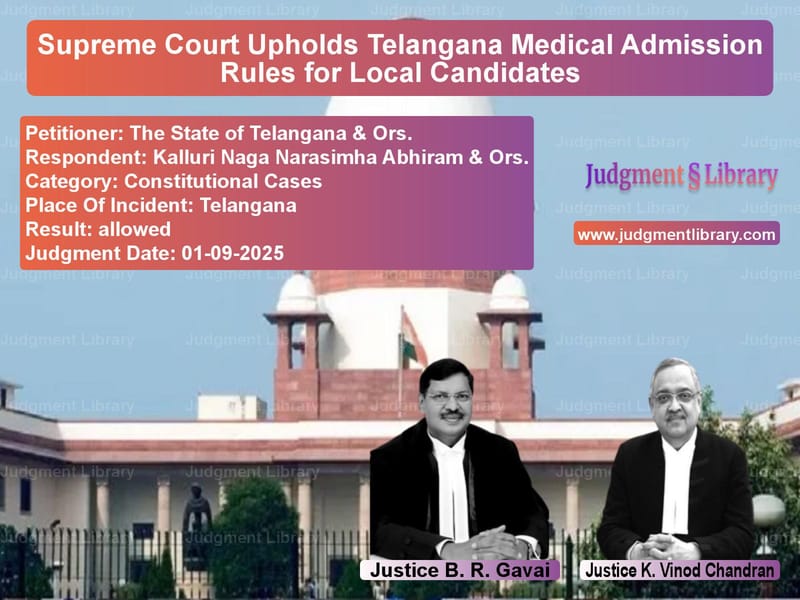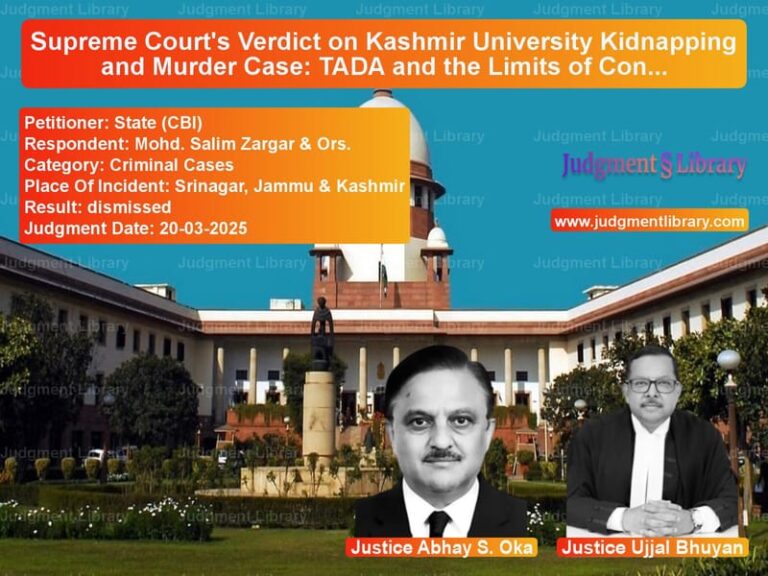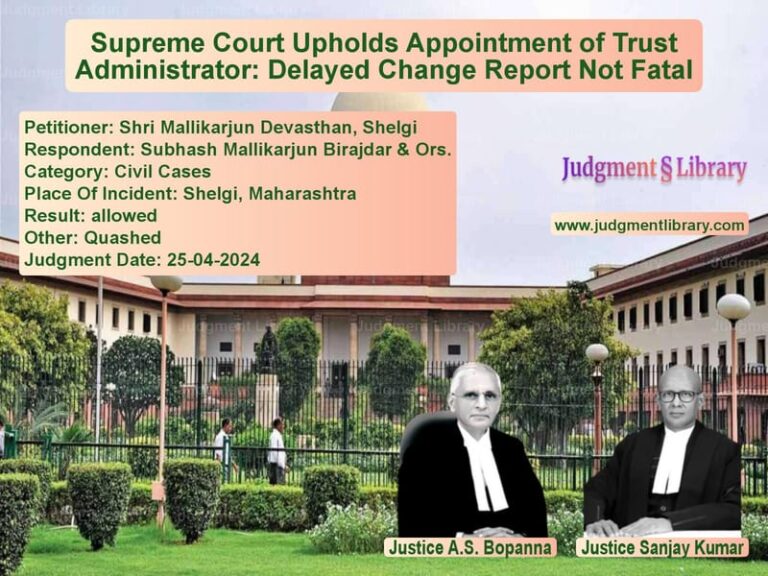Supreme Court Upholds Telangana Medical Admission Rules for Local Candidates
In a landmark judgment that clarifies the constitutional validity of reservation policies in medical education, the Supreme Court of India has upheld the Telangana government’s rules defining ‘local candidates’ for admission to MBBS and BDS courses. The case involved multiple appeals challenging the High Court’s expansion of the definition of local candidates, which the Supreme Court found to be an overreach into legislative domain.
The Constitutional Question
The central legal issue before the Supreme Court was whether the High Court could interfere with and expand the definition of a ‘local candidate’ entitled to apply under the ‘Competent Authority Seats/Quota’ through judicial intervention under Article 226 of the Constitution. The definition had been established through subordinate legislation in consonance with a Presidential Order issued under Article 371D of the Constitution of India.
The State of Telangana argued that the expansion of the definition by the High Court would frustrate the special provision under Article 371D, which was intended to confer benefits to local candidates who could be given preferential admission to medical courses. The State contended that the true test for determining local status was not merely nativity by descent, but actual residence and continued education within the State, culminating with appearance in the qualifying examination within the State.
The State countered that the definition has been molded in such a manner as to not only benefit those people who studied and resided for a considerable period within the State; but also ensure that those students who come from the marginalized sections are included. Such persons are those who are born into families who do not have the capacity to send their children outside the State and the Country for availing better educational facilities or expert and focused training to appear for the competitive entrance examinations. Most likely these are the persons who would remain within the State and offer their services to those residing in the State, which has a dearth of qualified medical practitioners.
The Students’ Perspective
The respondent students argued that the definition of local candidate itself is gross and does not reckon the vagaries of life and employment of the parents, which takes the children away from the State, whose roots remain all the same within the State. They highlighted various personal circumstances where students had studied from first to tenth standard within Telangana but had to move away for secondary and higher secondary studies due to parents’ transfers, better educational opportunities, and other life situations.
Historical Background
The Supreme Court traced the genesis of preferential admissions to professional courses in the undivided State of Andhra Pradesh and subsequently in the newly formed State of Telangana. Article 371D, as it stood before the division, referred to special provisions with respect to the State of Andhra Pradesh for providing equitable opportunities and facilities to the people belonging to the State, both in matters of public employment and education.
After the division of Andhra Pradesh, the nominal heading was substituted to include the State of Telangana, enabling the President to provide for equitable opportunities and facilities for people belonging to different parts of such States. The Andhra Pradesh Educational Institutions (Regulations of Admissions) Order, 1974, divided the State into three local areas and defined local candidates based on their educational history within these areas.
The Supreme Court’s Legal Analysis
The Supreme Court conducted a thorough examination of the legal framework, emphasizing that the source of power to legislate has to be traced to Article 245 read with 246, while the entries in the three lists under the Seventh Schedule of the Constitution are fields of legislation. The Court noted that the States’ power to legislate in the field of education as covered under Entry 25 of LIST III has to be traced to Articles 245 & 246, especially when there is no Union legislation on the subject.
The Court made a crucial observation about legislative competence: The entries in the three lists are only legislative heads or fields of legislation; they demarcate the area over which the appropriate legislatures can operate. This principle, established in Union of India v. H.S. Dhillon, was fundamental to the Court’s reasoning.
The Court found that the Admission Act of 1983, which authorized the Rules of 2017, specifically enabled rules to be brought out not only with respect to reservation of seats to the members belonging to Scheduled Castes, Scheduled Tribes and Backward Classes, but also other categories of students, as may be notified by the Government in this behalf and the Presidential Order has been specifically referred to in the above Act.
Precedents on Educational Reservations
The Supreme Court extensively reviewed its previous decisions on similar matters. In D.P.Joshi v. State of Madhya Bharat and Ors., the Court had upheld the levy of capitation fee on those students residing outside Madhya Bharat. The object of the classification, found to be justified, was the State’s desire to help at least to some extent the students who are its residents, encouraging education of the indigenous people, especially when the State spends money for the upkeep and running of the educational institutions.
This precedent was followed in Kumari N.Vasundara v. State of Mysore & Anr., which prescribed conditions of residence for ten years in the State of Mysore. The Court had repelled arguments about hardship caused by parents’ transfers, holding that mere likelihood of hardship cannot result in the striking down of a rule and in any event, hardship is likely to arise in the working of almost any rule.
In Pradeep Jain v. Union of India, the Court famously observed that equality must not remain mere idle incantation, but it must become a living reality for the large masses of people. The Court held that departure from merit-based selection was justified to bring about real equality of opportunity between those who are unequal, based on State interest and a region’s claim of backwardness.
Court’s Reasoning and Final Decision
The Supreme Court expressed its inability to uphold the High Court’s judgment, stating that in the wake of the binding precedents, holding the field for three score and ten years; a lifetime, we are unable to accede to the claim of the students who did not fall under the definition that the rule is exclusionary, arbitrary and constitutionally invalid.
The Court emphasized that it could not interfere with policy formulation unless validly challenged on gross discrimination, clear arbitrariness, patent illegality, perversity or unconstitutionality. The existing definition was found to be in consonance with the Presidential Order and similar rules having been upheld by this Court as coming out from the binding precedents.
Mitigating Measures
While upholding the strict definition of local candidates, the Court noted that the learned Advocate General for the State of Telangana had proposed a further amendment incorporating a proviso to Rule 3. This proviso would make eligible candidates who studied outside Telangana during the requisite four consecutive academic years if they fall under specific categories:
Children of employees of the Telangana State Government who have served or are serving outside Telangana; Children of serving or retired employees belonging to the Telangana cadre of All India Services; Children of defence personnel/ex-servicemen/Central Armed Police Force service who declared their hometown in Telangana; and Children of employees of Corporations/Agencies under Government of Telangana liable to be transferred anywhere in India.
The Court observed that the said proviso should allay and mitigate the grievances of those who claim that they were taken out of the State by compulsion of the movement of their parents outside the State by reason of employment.
Final Outcome
The Supreme Court allowed the appeals of the State and the University, setting aside both the impugned judgments in the Writ Petitions filed by the students. The Court upheld the Rules of 2017 as amended in 2024, with the reservation that candidates covered by the proposed proviso would be eligible. The Court also clarified that admissions made in the previous academic year based on government concession would not be disturbed.
This judgment reinforces the constitutional framework for regional reservations in educational institutions and establishes clear boundaries for judicial intervention in policy matters related to education and reservations. It balances the State’s interest in providing equitable opportunities to local students with the need to accommodate genuine cases of hardship due to parents’ employment conditions.
Petitioner Name: The State of Telangana & Ors..Respondent Name: Kalluri Naga Narasimha Abhiram & Ors..Judgment By: Justice B. R. Gavai, Justice K. Vinod Chandran.Place Of Incident: Telangana.Judgment Date: 01-09-2025.Result: allowed.
Don’t miss out on the full details! Download the complete judgment in PDF format below and gain valuable insights instantly!
Download Judgment: the-state-of-telanga-vs-kalluri-naga-narasim-supreme-court-of-india-judgment-dated-01-09-2025.pdf
Directly Download Judgment: Directly download this Judgment
See all petitions in Reservation Cases
See all petitions in Education Related Cases
See all petitions in Fundamental Rights
See all petitions in Constitution Interpretation
See all petitions in Judgment by B R Gavai
See all petitions in Judgment by K. Vinod Chandran
See all petitions in allowed
See all petitions in supreme court of India judgments September 2025
See all petitions in 2025 judgments
See all posts in Constitutional Cases Category
See all allowed petitions in Constitutional Cases Category
See all Dismissed petitions in Constitutional Cases Category
See all partially allowed petitions in Constitutional Cases Category







